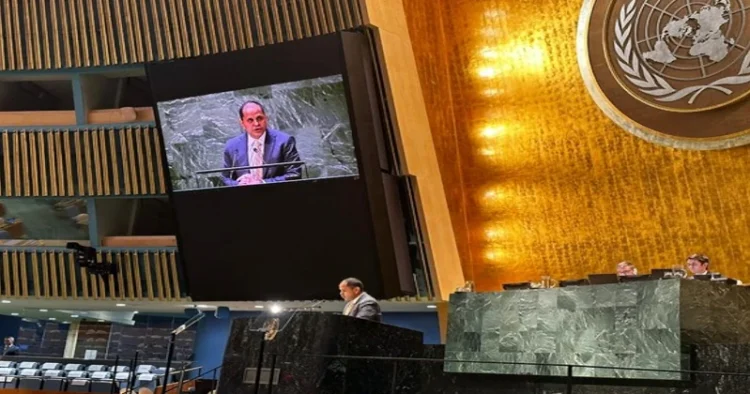In a statement at the UN Summit, Indian Counsellor Pratik Mathur underscored the need for revitalising the General Assembly’s pivotal role amidst concerns about its “diluted” relevance.
He also expressed concern over attempts to discuss thematic issues primarily in the Security Council. Mathur emphasised the critical role and authority of the General Assembly as the chief deliberative policy-making and representative organ of the United Nations.
“The attempts to discuss thematic issues in the Security Council have also undermined the role and authority of the General Assembly. Hence, my delegation would like to reiterate that India has consistently advocated the view that General Assembly can be revitalised only when its position as the chief deliberative policy-making and representative organ of the United Nations is respected both in letter and in spirit,” said the Indian Counsellor.
“The General Assembly should take the lead in setting the global agenda and restoring the centrality of the United Nations in formulating multilateral approaches to resolving transnational issues,” he added.
Acknowledging shared responsibility, Mathur pointed out that some blame lies with the General Assembly and its member states for allowing its relevance to be diluted. “We must admit that some of the blame lies with the General Assembly and its member states for having allowed its relevance to be diluted despite being the collective voice of all nations,” he said.
Citing the President of the General Assembly’s recent statement on questions about the UN’s relevance and existence, Mathur emphasised a growing perception that the General Assembly has lost touch with its foundational responsibilities, becoming overwhelmed with processes.
“However, as pointed out by the President of the General Assembly when he opened this meeting last week, ‘at a time when questions about the relevance of the UN, itself and therefore about its very existence are echoing louder’…There is a growing perception that the General Assembly has gradually lost touch with its foundational responsibilities and has become overwhelmed with processes,” said Mathur.
As debates about the UN’s role intensify, India’s call for General Assembly revitalisation stands as a crucial assertion, urging member states to respect its position as the collective voice of all nations and reinforcing its role in shaping the global agenda.
In September this year, External Affairs Minister S Jaishankar also said that the resistance of the United Nations to reform its structure will eventually lead to the body being “anachronistic” and people will start finding solutions outside.
Addressing an event, Jaishankar gave an “injudicious” reference of passengers sitting in a bus drawing a comparison with the permanent members of the UN Security Council.
“I somewhere injudiciously…described it like a passenger in a bus. A person sitting on the seat will not vacate it for the next person. So there are these five guys sitting. Sometimes, you see such passengers, you see someone is tired, someone is carrying a baby, they will not get up and give up that seat,” he said.
The External Affairs Minister further said that the pressure to change has grown over the years at the UN, and the message needs to be understood by the global body. Notably, reforms in the global system have been an issue continuously raised by India and Prime Minister Narendra Modi on the global stage.
(with inputs from ANI)




















Comments